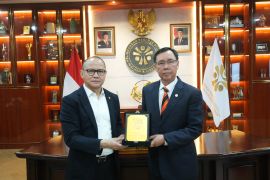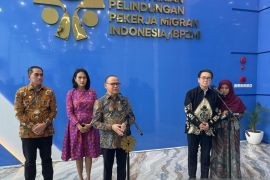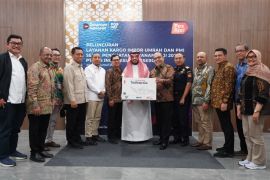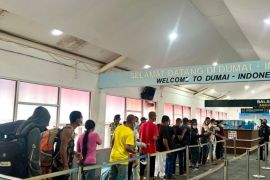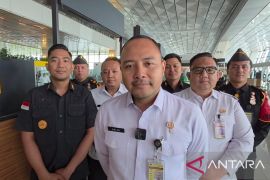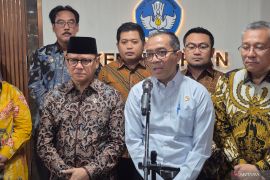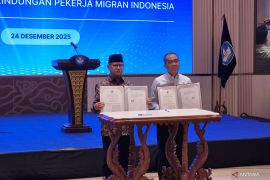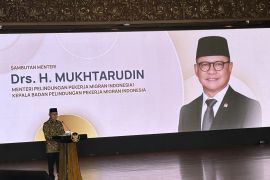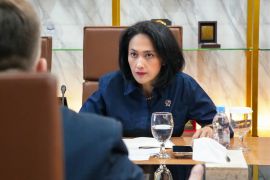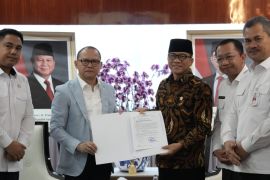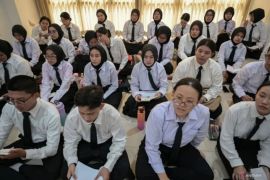The agreement to take up the issue in the conference was reached after a tough debate because both migrant workers exporters and importers had different opinions.Jakarta (ANTARA News) - Exporter countries of ASEAN migrant workers were glad when ASEAN delegates agreed at the opening of their meeting in Semarang, Central Java, on Sunday, to discuss migrant workers` protection and promotions of their rights.
Yet, the ASEAN Social Cultural Community (ASCC) at its meeting which lasted from October 9 to 11, 2011 failed again to discuss the issue which had been on deadlock since 2009.
"It has not yet been discussed in the conference this time. It is expected to be discussed in the next ASCC meeting," Chief Minister for People`s Welfare Agung Laksono said on Monday referring to the results of the ASCC talks which will be taken to the ASEAN summit for endorsement in Bali next month.
On the first day of the Senior Officials Committee for ASCC (SOCA) delegates were reported to have met in mind on the deliberations of the ASEAN migrant workers` protection and rights promotions.
"This is an extra-ordinary achievement because we have agreed to discuss the issue which had been on deadlock since 2009. There is a positive development where talks on migrant workers` protection and promotions of their rights will be continued," Nina Sardjunani, the Indonesian chief delegate to the ASCC conference said last weekend.
Nina said that the agreement to take up the issue in the conference was reached after a tough debate because both migrant workers exporters and importers had different opinions.
The exporter countries are Indonesia, the Philippines, Thailand and Myanmar while the importer ones are Malaysia, Singapore and Brunei Darussalam.
"The debates were tough because we discussed not only documented migrant workers but also those undocumented ones. But then we agreed that there had been a positive development," Nina said.
According to Rizki Safary, a member of the Indonesian delegation to the ASCC meeting, exporter countries wanted equal protection and right promotions between documented and undocumented migrant workers.
What is encouraging is the fact that the meeting on the issue was not attended by only four countries such as in the previous meeting but 10 ASEAN member countries which agreed to discuss the important issue, Rizki said.
However, Chief Welfare Minister Agung Laksono ascertained in the run-up to the end of the conference that the migrant workers` issue was not discussed but put off until the next ASCC meeting.
"It will be discussed in the ASCC conference," the minister said on Monday.
He said that the delegates failed to carry out their agreement to discuss the issue. "The matter will be discussed in the next meeting because delegates did not agree to it now," the minister said.
Agung said that there was no agreement yet between exporter countries and importer states. Indonesia hoped that documented and undocumented workers should not receive different treatment. However, this proposal was not accepted by importer countries.
With the failure of the talks on migrant workers` protection and rights promotion, it is almost certain that the issue would not be taken to the summit of the Association of South East Asian Nation (ASEAN) in Bali next month.
Virtually, the other issue regarding ASEAN migrant workers concerns the free flow of manpower within the region in connection with its plan to establish an integrated economic community in 2015.
Indonesia last May called on the 18th ASEAN Summit in Jakarta to discuss the need for ASEAN countries to open up to migrant workers from within the region.
"Migrant workers in ASEAN or ASEAN migrant workers who are outside the region need protection. ASEAN countries also need to open themselves to migrant workers from other member countries such as Indonesia," head of the National Agency for Placement and Protection of TKIs Abroad (BNP2TKI), Moh Jumhur Hidayat said.
The Indonesian manpower official made the statements in response to the fact that so far only three ASEAN members had recruited Indonesian migrant workers (TKIs), namely Singapore, Malaysia and Brunei Darussalam.
"I have often received complaints from employers in a number of ASEAN member countries who need TKIs but they would either not allow it or impose too tight regulations so that they could receive migrant workers from Indonesia," Jumhur Hidayat said.
Data on the placement of Indonesian migrant workers in the Asia Pacific region in 2010 indicated that there were only three countries which had accepted TKIs.
Based on the data, Malaysia had received 116,056 Indonesian migrant workers, Singapore 39,623 and Brunei Darussalam 7,360 workers. There was no TKI recruitment in the Philippines, Vietnam, Cambodia, Myanmar, Laos and Thailand. The Philippines is the even competing with Indonesia in the placement of workers abroad.
The number of Indonesian official migrant workers in Malaysia stood at 917,332, in Singapore 106,000 and in Brunei Darussalam 50,000.
He said that the Indonesian government was launching intensive promotions of its formal workers in various countries in Europe, Australia, the United States, Canada, Japan, South Korea and others.
"Japan and countries in the Middle East are main destinations for Indonesian migrant nursery workers. They admitted that the Indonesian nurses have good skills. Demand for Indonesian nurses from these countries continues to increase every year," the BNP2TKIS chief said.(*)
Reporter: by Andi Abdussalam
Editor: Heru Purwanto
Copyright © ANTARA 2011
